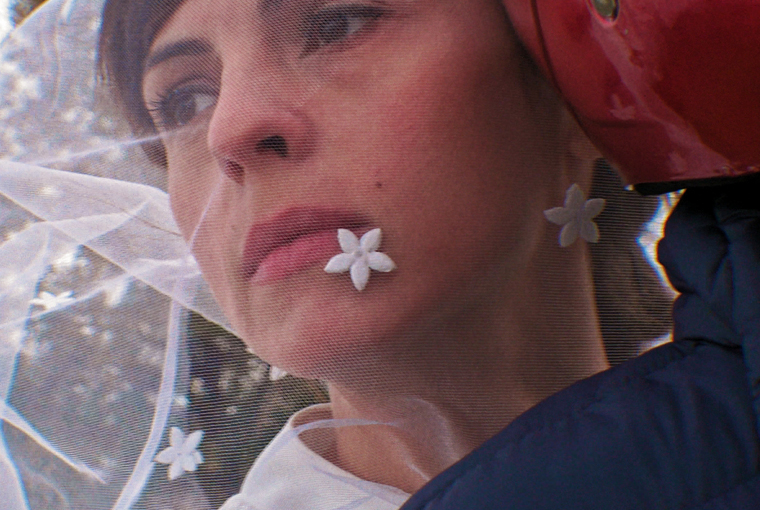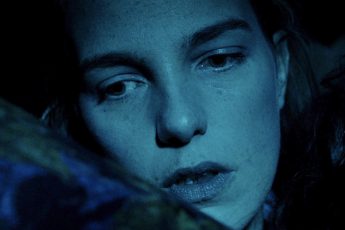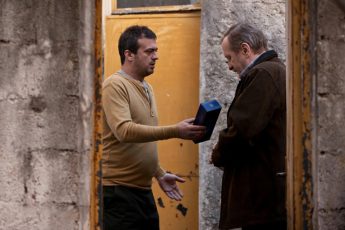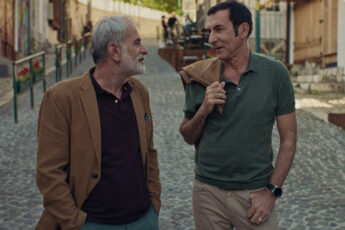The Bosnian "À bout de souffle"
Aida Begić’s A Ballad (Balada, 2022)
Vol. 131 (January 2023) by Ana Grgić and Antonis Lagarias
Discovery always means learning that objects are not as we had believed
them to be; to know more, one must first abandon the most evident certainties of established knowledge.
– Jean Epstein1
In an interview given to the French press in the 1980s, Yugoslav writer Danilo Kiš noted how “Westerners expect Eastern European authors to concern themselves with politics, not love”.2 Sometime earlier, in his well-known critical text Homo Poeticus, he argued how “Homo politicus is for us Yugoslavs”,3 and further explained how he as an author from this very region struggles to navigate the desire to write about love, death and existential questions, and somehow feels guilty when not dealing with politics. The talented Bosnian filmmaker Aida Begić, who studied at the Film and Theatre Directing of the Academy of Performing Arts in Sarajevo during the brutal siege of the city in the 1990s, started her filmmaking career during wartime. She has long felt compelled to broach themes dealing with the consequences of the Yugoslav Wars. But Aida Begić returned to the 2022 Thessaloniki International Film Festival with a tour de force film which challenges our view of contemporary Bosnian cinema. A Ballad had its international premiere in the Balkan Survey program curated each year by Dimitris Kerkinos. A Ballad is a film about love, freedom and limited horizons told through the story of female protagonist Meri (Marija Pikić), who leaves her partner and daughter and returns home to an overprotective mother and a closed society, all while trying to pursue a career in acting. Begić, who is well-known for dealing with the traumas of the Bosnian War in her critically acclaimed films (Snow from 2008 and Children of Sarajevo from 2012), makes a bold new statement with A Ballad, opening new horizons for the future of Bosnian cinema.
A Ballad was entirely produced with domestic funds, which is highly unusual for recent Bosnian films and filmmakers who, due to a lack of finances and possibilities in the country, often look for co-production partners in Europe and beyond to bring their projects to the screen. This makes A Ballad a low-budget production, which meant, as Begić explained in the post-screening Q&A in Thessaloniki, that she and her crew, in particular her long-time collaborator and cinematographer Erol Zubčević, had to find alternative creative solutions to finish the film. Similarly to the filmmakers of the Danish Dogme 95, who for both ethical and aesthetic reasons, adopted new low-budget video technology in the late 1990s to make their bold and politically challenging films which critique the complacency and hypocrisy of Scandinavian society, Begić and Zubčević invested in low-budget handheld cameras with which they shot the entire film. However, A Ballad is not a copy of the Danish Dogme aesthetics. Rather, it takes the experimental approach further, opening a dialectic dialogue with the visual registrar of contemporary society, such as the playful aesthetics of self-produced videos proliferating on digital platforms. This visual experimentation is particularly evident through the film’s imaginative and playful approach to colors, where entire scenes appear saturated in bright pink, red or dark blue, or where the camera flips 180 degrees, with the sky and earth reversed, unsettling the spectator’s complacency with the fictional world portrayed on screen. The film goes even further in the night-scene where Meri’s partner, Hasan (Milan Tocinovski), who feels abandoned, runs exasperated down the street while the camera follows his movement in one long take, as he enters in and out of grainy, video-generated darkness. In a different scene, we see Hasan contemplating his “happy” relationship with Meri as moving images of their holidays mysteriously appear on a wall behind him, a visual manifestation of his memories and inner thoughts. More than a playful technique to show how one experiences mourning and loss, this scene also reflects contemporary spectatorial behaviors and re-confirms the film’s self-reflexivity. The latter is also evident in the recourse to genre conventions, such as the musical, in which the characters break the narrative structure of classical film by engaging in subtle performance and song to express their innermost feelings and thoughts.
The consumerist ideology of neoliberal societies, the influence of “selfie” culture and the Instagram-ization of younger generations in the Balkan region (i.e. the possibility to gain fame and wealth by sharing self-produced videos and images on social media), and, at the same time, a deep desire to overcome one’s limited horizons, is foregrounded through both the main and supporting characters. The film’s central narrative plays with the fantasy and illusion of contemporary talent shows and music contests. Most female characters project their fantasies within the context of talent shows (imagining themselves performing on a dark theater stage), and Meri herself is part of a casting process for a theater play, where she auditions for Chekhov’s The Seagull by convincingly performing Nina’s famous ending monologue. However, even if open to criticism, this kind of fantasy is an honest and courageous way of attempting to overcome one’s horizons. Indeed, it is no accident that Meri succeeds in her performance as Nina. Like Chekhov’s character, Meri’s strength lies in believing she is able to overcome the limitations of her birthplace and origins, and in having the courage to keep “dreaming” even if everyone around her warns her against it.
The film, though, adds another layer to this seemingly dreamy dimension of its female characters through the presence of Meri’s new friend, Adela (Lana Stanišić), who runs her own hair salon, and whose partner went to prison, leaving her to the mercy of loan sharks. Unlike Meri, Adela is pragmatic, and a prime example of an independent woman who despite appearing to be a victim to societal ideals of femininity, is always ready to fight off the local mafia, and supports Meri both emotionally, by engaging in pep talks, and materially, by proposing Meri to move in with her. Begić, indeed, presents us with multi-faceted women characters, challenging a black-and-white reading of “feminism” and its practical application in society. For example, Meri’s mother reproduces existing patriarchal structures, as she is only concerned about her daughter’s unmarried situation, and desperately seeks to arrange her marriage to an old flame, Samir. In another scene, three young men, including Meri’s child-like brother, rap to the mobile camera, the framing and composition of the scene clearly echoing videos which proliferate on TikTok. Ultimately, what these examples reflect, is actually a sharp cultural, social and political critique that hints at the high youth unemployment rate in Bosnia (around 35%) and more generally in the countries of the Balkan region, which has recently resulted in emigration waves toward Northern and Western Europe and a consequent “brain drain”. That contemporary Europe is in crisis is nothing new to Bosnian society, which has permanently been stuck in political impasse and economic crisis since the collapse and devastating consequences of the Yugoslav wars. Yet the film is very sensitive in its portrayal of contemporary Bosnian society and avoids black-and-white morals. For instance, Samir (Slaven Vidak), who eventually exploits Meri’s precarious situation by forcing her to marry him, is still depicted as a fragile individual, thus complexifying his initial function of representing male authority. Like before, this fragility is introduced through a break in the filmic form and the inclusion of music. Seated alone in a restaurant, Samir eats a pie and, for a moment, the lights dim as he finds himself inside a dream-like moment where he is allowed to freely sing a song. Instead of condemning Meri’s antagonists, the film underscores their flaws and weaknesses as they walk with limited (cultural, social, and financial) resources on an uncertain path of suppressed desires.
A Ballad feels incredibly fresh for the regulars of the film festival circuit, where the majority of films from the Balkans have come to designate and emanate so-called “misery porn”. This is perhaps a side effect and consequence of the vicious cycle of the ever-proliferating talent labs, script doctors, festival workshops and European funding schemes, which at times seriously limit and circumscribe stories and creative expression to select social issues. The film is full of sensations, and breaks cinematic rules, not only continuously reminding us that we are watching a film. Just like Jean Luc Godard’s much celebrated À bout de souffle, the film literally leaves the spectator breathless. It is a self-reflective and self-reflexive gaze at contemporary Bosnian society, in particular its gender dynamics and youth. Though the film has been labelled “a feminist emancipation story”, A Ballad refuses a simplistic reading or labels dear to identity politics, and in fact, problematizes the issue of women’s emancipation, not only through the depiction of complex women characters which negotiate their place within patriarchal structures, but also through turning the narrative on its head. A Ballad is a story inside a story, a film inside a film. At the end of the film, our protagonist Meri escapes from a loveless marriage of convenience, arranged by her mother (who reproduces the dynamics of a patriarchal society), and returns to her partner Hasan, who, feeling betrayed by Meri’s abandonment of their home, stabs her to death to reclaim his honor as a man. In fact, the fictional story draws inspiration from the seventeenth century South-Slavic folk ballad, Hasanaginica (or The Mourning Song of the Noble Wife of the Hasan Aga) set in the Bosnian vilayet during Ottoman rule, in which Fatima, the wife of a Hasan-aga, refuses to follow her husband to the battlefield. To punish her, he banishes her from their castle, and she dies of sorrow from being unable to see her children. Hasanaginica has been adapted to the screen by male directors in former Yugoslavia (in a fiction film in 1967, and a TV film in 1983), but the story has not been told by a female author nor from the woman’s perspective, which renders the loose adaptation of Aida Begić’s A Ballad the first attempt.
Returning to the film’s ending, Meri, the actress, stands up and walks away, revealing that we have been watching the making of a film, shattering the fictional and privileged complacency of cinema spectators. As Meri, the actress, walks away with her on-screen eight-year old daughter Mila, also an actress, from the film set, the two engage in a dialogue about the film’s ending. Begić’s choice of ending challenges our preconceived notions and simplistic narratives of women’s struggles, emancipation, and gender dynamics, not only within the Bosnian context but also beyond, because it highlights the deep-rooted inequalities and frameworks of patriarchal societies tout court. This particular ending strikes us as all the more meaningful if one indeed attempts to think of the film under the label of “feminist emancipation”. In typical (so-called feminist) social dramas or melodramas, female protagonists in search of emancipation become aware of their place within a male-dominated world and attempt to re-define themselves according to their own dreams and desires. In other words, if current dominant social and cultural forces promote patriarchal behaviors, a feminist approach is expected to present an antithesis by shaping female characters who succeed in resisting and breaking free from male expectations, or at least identify and denounce the social processes that produce and proliferate men’s domination. Here, however, Begić goes beyond a thesis/antithesis structure by completely breaking apart the “rules” and the illusion of filmmaking and reminding us that another reality exists “behind the camera” and beyond the film’s universe. One could see this choice as a comment on the nature of true emancipation, which can only be achieved through radical rupture and refusal, in this case, of the cinematic form which continues to reproduce patriarchal structures.
Pushing boundaries of cinematic language and form, A Ballad departs from realism and “allegories of underdevelopment” of many contemporary Balkan films, and emphasizes that cinema can be and is an “experimental audiovisual medium” with the “magic” ability to “think an image of the universe”.4 By reclaiming the magic of cinema5 through bold, expressive aesthetics and a self-reflexive approach of what it means to make a film, Begić reminds us of cinema’s dialectic and interconnected relationship with ideology and philosophy. Perhaps, the magic of cinema lies precisely in its ability to be a thinking apparatus, “le machine à penser” (Jean Epstein), that allows us to think through and with moving images.
References
- 1.Epstein, Jean (1977). “Magnification and Other Writings’’. Transl. by Stuart Liebman. In: October, Vol. 3, 9-25.
- 2.From an article/interview in Le Nouvel Observateur, Jan 28 – Feb 3, 1980, qtd in: Kiš, Danilo (1995). Homo Poeticus. Essays and Interviews. Ed. and with an Introduction by Susan Sontag. New York: Farrar, Strauss and Giroux, 259.
- 3.Ibid., 76.
- 4.“The cinematograph is also an experimental apparatus that constructs, that is to say, thinks an image of the universe […]’’ in Epstein, Jean (2014) [1946]. The Intelligence of a Machine. Transl. from French by Christophe Wall-Romana, Univocal Publishing LLC, 104.
- 5.In the post-screening Q&A at Thessaloniki, Aida Begić confessed she had been missing the magic in cinema.




Leave a Comment